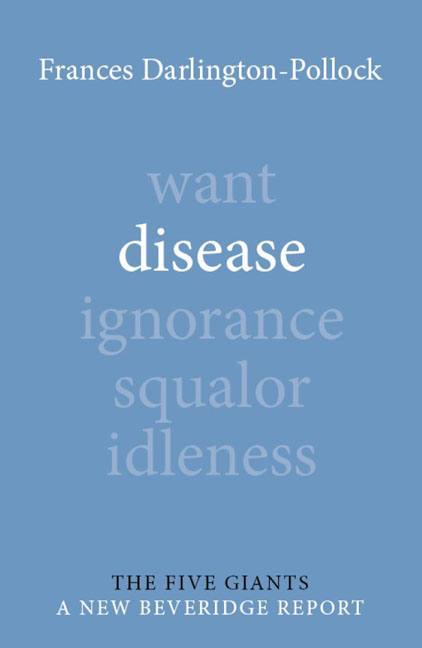Book contents
- Frontmatter
- Contents
- Acknowledgements
- 1 Introduction: A Revolutionary Moment
- 2 Disease: An Evolving Giant
- 3 Unequal Health and the Behemoth of Today
- 4 From Cradle …
- 5 … to Grave: The Problem of Age
- 6 Inequity and Inferiority: A Dismantled Health and Social Care Service
- 7 Continuing Challenges, Contemporary Crises
- 8 Shoring up “Assumption B”
- References
- Index
5 - … to Grave: The Problem of Age
Published online by Cambridge University Press: 20 January 2024
- Frontmatter
- Contents
- Acknowledgements
- 1 Introduction: A Revolutionary Moment
- 2 Disease: An Evolving Giant
- 3 Unequal Health and the Behemoth of Today
- 4 From Cradle …
- 5 … to Grave: The Problem of Age
- 6 Inequity and Inferiority: A Dismantled Health and Social Care Service
- 7 Continuing Challenges, Contemporary Crises
- 8 Shoring up “Assumption B”
- References
- Index
Summary
The gradual retreat of Beveridge's attack on want, squalor, ignorance, idleness and disease has been cloaked by the principle of fairness: “Where is the fairness, we ask, for the shift-worker, leaving home in the dark hours of the early morning, who looks up at the closed blinds of their next-door neighbour sleeping off a life on benefits?” (Hamnett 2013: 499), to quote the Conservativeled coalition's George Osborne as a compelling example of the political appropriation of the concept of fairness. Such pronouncements are deliberate efforts to incite anger towards the lazy benefit scrounger living comfortably off the back of your hardearned taxes in order to justify scaling back or cutting benefit payments in general.
The Labour Party, too, were guilty of maligning benefit recipients, building their approach to welfare reform on the USA’s “Welfare to Work” legislation that made benefit provision conditional on job-seeking (Hamnett 2013). With the introduction of austerity, this approach escalated. Cutting and capping benefits while tightening eligibility criteria forced many into low-paid, precarious work. At the same time, public services were scaled back or lost. We saw examples of this in Chapter 4: cuts amounted to 750 closed youth centres, 4,500 youth work jobs lost, temporary closures of maternity units and severe wait times for mental health support. For the working-age group, the structural violence of austerity has been condemned as social murder: more people died from malnutrition, more homeless people died on the streets and for every 10,000 work capability assessments completed there were six more suicides (Grover 2019).
The reach of this violence extends far beyond the working ages. Although many older people, through the pension triple lock, were protected against any real-term loss to their state pension and assured that it would, as a minimum, increase in line with inflation, austerity was just as lethal for the less advantaged pensioners. The impact can only be construed as structural violence, which is present when violence is “built into the structure [of society] and shows up as unequal power and consequently as unequal life chances” (Galtung 1969: 171). It is evident that our welfare state is now failing. It is failing our children, it fails our workforce and it is failing our ageing population.
According to the Office for National Statistics life expectancy calculator, I currently have an average life expectancy of 88 years with a one in ten chance of reaching 100.
- Type
- Chapter
- Information
- Disease , pp. 69 - 84Publisher: Agenda PublishingPrint publication year: 2022



